The opportunity to own a prototype doesn’t occur every day, and those with the available funds will often seize the opportunity with both hands. This 1980 Ford M81 McLaren Mustang Prototype is 1-of-10 cars produced before the M81 program was axed. It presents in as-new condition and has a genuine 556 miles showing on its odometer. The owner is ready to part with what many would consider a unique vehicle, listing it here at Mecum Auctions in Indianapolis, Indiana. It is set to go under the hammer on Thursday, May 18th, with a guide price of $75,000 – $100,000.
The Ford M81 McLaren Mustang was developed out of what was seen as a matter of necessity. Fuel prices were spiraling, and with emission regulations becoming tighter, a forced-induction future seemed inevitable. The M81 was a joint effort between Ford, Creative Car Craft, and McLaren. Rather than focusing solely on engine performance, the team took a “total package” approach. Thus, the body received some wild enhancements from Creative, and almost all were practical. The fender flares are not fiberglass but are hewn from real steel. They cover significantly wider BBS alloy wheels, while the NACA ducts in the rear quarters feed cooling air to the brakes to improve efficiency and reduce heat. The grille-less front end features a front spoiler that improves downforce while providing cold air to the engine and front brakes. The hood vents are functional, sucking away engine bay heat. The only thing missing is a rear spoiler, and the lack of this item gives the car a slightly “unbalanced” appearance. Seven of the ten Mustangs produced were finished in the Bittersweet Orange gracing this car’s panels. Its presentation is hard to criticize, with the paint shining beautifully and the decals looking crisp. The aerodynamic appendages are in good order, and those magnificent BBS wheels look flawless.
The Mustang’s interior emphasized function over form, although the initial plan was for buyers to still select items like factory air conditioning as fitted to this car. Occupants were held firmly in body-hugging Recaro bucket seats, with the driver viewing an array of Stewart Warner gauges through a leather-wrapped Racemark wheel. A rollbar added to vehicle rigidity while offering improved occupant protection. This Mustang is as it left the factory, and its interior presents as you might expect from any classic with a three-digit odometer reading. There are no aftermarket additions, and the unique numbered plaque occupies its rightful spot on the dash.
Company plans were to build 250 of these Mustangs, each with an individually numbered brass plaque on the dash. Sadly, only ten rolled out of the factory, and the plaque on this car sets it apart from its siblings. The “P” at the end of the production number confirms that this is a prototype, the rarest of all creatures. This car spent its early days touring dealerships as a display and promotional vehicle. It also featured as the cover car on an issue of Motor Trend magazine, with the magazine conducting the test with the vehicle running on relatively low boost. Its history since then is unclear, although the odometer reading confirms nobody has gone out of their way to wear out this classic.
Ford’s contribution to the M81 project was to determine how to produce the car using as many components from its parts bin as possible. The 2.3-liter turbocharged four was handed to McLaren to weave its magic. After polishing, deburring, and blueprinting everything, the motor was reassembled with adjustable boost. The production engine pumped out 130hp on 5psi, but the McLaren unit pushed the power to 175hp, although the figure was as high as 190hp with the cabin-mounted boost knob wound to the maximum (11psi) position. Motor Trend magazine tested the Mustang, achieving a somewhat disappointing ¼-mile ET of 17.37 seconds. However, this was set with a mere 7psi of boost, suggesting there was more to be squeezed from the package. Shifting duties fell to a Ford four-speed manual transmission, while brakes were sourced from various Blue-Oval models. However, the team turned to Koni for upgraded and adjustable springs and shocks to complete the package. We receive no information on how the car runs or drives, but I can’t help but feel that may be irrelevant. I won’t be surprised if this classic finds itself in a museum rather than prowling our streets as its creators intended.
Placing a value on a car like this 1980 Ford M81 McLaren Mustang is challenging because its prototype status is a game-changer. The rarity of the production versions means they seldom come on the market, but my detective work means I may have struck paydirt with this car. I found #10, which went under the hammer in 2016 with 5,000 miles on the clock. It sold for $36,250. However, I believe this car crossed the auction blocks with Barrett-Jackson in 2020. The plaque photo in their listing isn’t clear, but I’m sure it’s the same vehicle. If that is correct, it sold with No Reserve for $37,400. If that is the same vehicle, it gives us a point to ponder; Fox-Body Mustangs have been strong market performers for several years, with values growing at an impressive rate. For this M81 to hit its auction estimate, that suggests an increase of at least 100% in less than three years. Is that possible, or will the hammer fall for a lower price? Even if it is beyond your financial means, this could be a fascinating auction to watch.
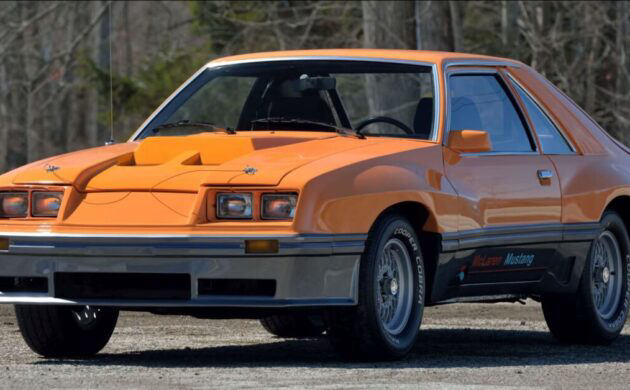
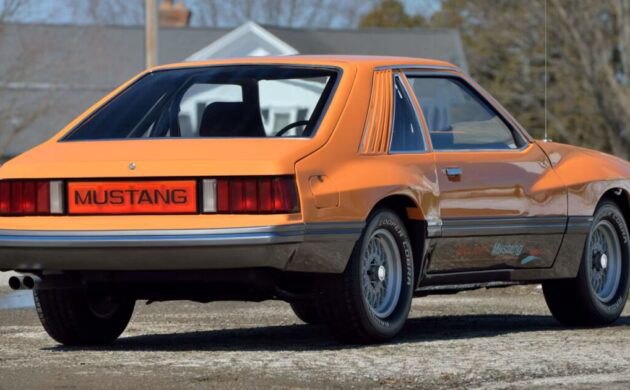
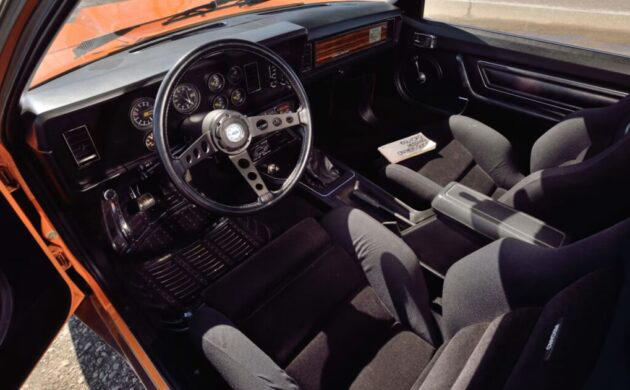
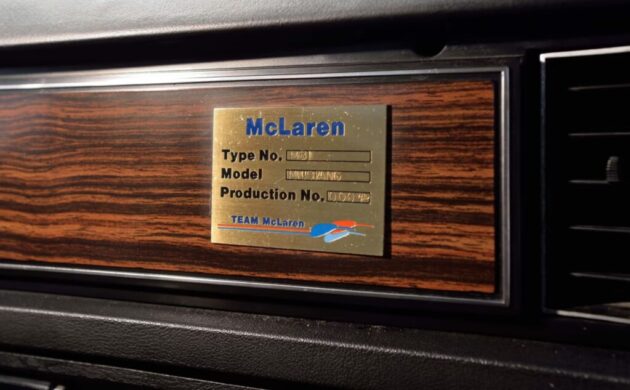
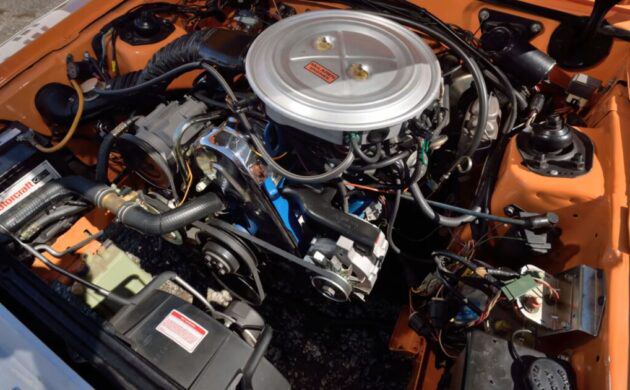
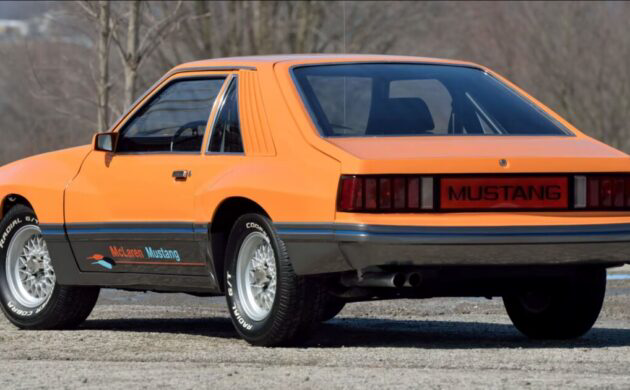



Looks like it got kissed by a Monza.
I remember seeing these featured in a car magazine (maybe car and driver) back in the day. As bizarre as they look now, I remember thinking they were pretty cool at the time
Wow, great article, Adam! And I love this car but then I am a Fox body fan.
Looks like it was put together with LEGO’s
It reminds me of those toy ‘Transformer’ cars.
I remember seeing one at a big Mustang show a few years ago. They do look bizarre to us today, kind of like all the 1980 styling themes and performance enhancements, on steroids, in one package. Looks like Mecum’s estimated range (which is typically high) might be previous prices times two, then rounded up for the upper range. Let’s see what it brings.
I wonder how many specialty models like this (of all makes and models) fell far short of their proposed production volume.
Back end looks cool 😎
With only 556 miles, this 1-of-10 Mustang deserves to be in a museum.
A fraternity brother had a 2.3 Turbo Capri in 1980, a fully loaded Ford executive car as his dad was a bigwig with the manufacturer. A few things I remember about the car were; the Recaro seats in it were spectacular. The Ford “Premium Sound” system had a Amplifier activated by pulling a small knob on the lower dash, sounded pretty decent when activated but why did you have a choice to activate? Finally, the Turbo Pinto engine was not very fast (nothing was in ‘80) but worse, was as agricultural as any production car I’ve ever heard, with incredibly bad noise, vibration and harshness transmitted into the cabin as the revs grew. I was driving a ‘79 Trans Am WS6 400 at the time, the Pontiac was much faster but the Capri was much more solid and put together better, but the Merc’s engine was a deal killer. 5 years later I ordered a new 5.0 Mustang convertible with the 210 HP rating. Amazing difference with the HiPo 302 compared to that 2.3.
Ugly then, ugly now, at any price.
It coulda’ had a V-8! It’s weird, but a piece of Mustang history.
Just because it’s rare doesn’t make it cool. Yuck
Have a picture of this car with the Team McLaren Race car on a banked turn.
I had a poster of one hanging in my bedroom, beside a poster of Bob Glidden heating his tires.